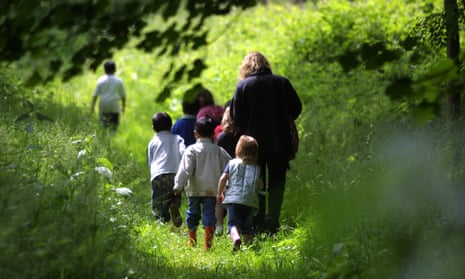Most adults will have treasured memories of splashing in muddy puddles and playing games in the local park. But today’s youngsters are leading far more enclosed lives. A recent study found that three-quarters of UK children spend less time outside than prison inmates.
This doesn’t just have a damaging impact on young people’s health – outdoor play increases fitness levels and raises levels of vitamin D, for example – there are also consequences for children’s educational development and wellbeing.
A growing body of evidence suggests that outdoor learning can boost children’s welfare and their performance at school. Research suggests that spending time interacting with nature can reduce stress among young people, and boost their creativity and problem-solving skills. A 2004 study indicated that students taking a part in an environment-based education programme reported increased levels of motivation.
There may also be untapped benefits for children with special educational needs: a small-scale research project in the US reported that contact with nature may reduce symptoms of attention deficit disorder in children as young as five years old.
But with a jam-packed curriculum and limited access to nature, finding the time or space for outdoor learning can be a challenge. So, with exam season and better weather (hopefully) on the horizon, how can teachers make the most of outdoor learning? How can teachers in built-up urban areas ensure their students get their fair share of time outdoors? What resources or training is available for teachers who want to introduce nature-centred education? And how can teachers ensure time outside is well spent?
Our panel of experts will be on hand on Wednesday 4 May from 5.30pm to 7.30pm to answer all your questions and debate the issues.
Join us to share your ideas, questions and experiences on outdoor learning. Our experts will be online during the time noted above, but comments are open now if you would like to post questions or suggestions in advance. You can also send questions for the panel by tweeting us @GuardianTeach or by emailing teacher.network@theguardian.com.
Panel
Jon Cree is the current chair of the Forest School Association and the training co-ordinator for Bishops Wood Centre which was recently transferred to the national environmental education centre charity, the Field Studies Council. Jon has been involved in nature and environmental education for over 30 years. His passions include storytelling in the outdoors, forest schools and earth education – he is the UK earth education training co-ordinator and has trained educators all over the world.
Cherry Duggan is head of schools and youth at WWF-UK. Her own personal connections with nature underpin her work, which spans over 30 years in the education for sustainability arena. She’s inspired by schools that embrace sustainability and believes we all have a responsibility to help children develop as environmental citizens – now and in the future.
Karen Letten is community engagement manager at the Woodland Trust. She works with schools and communities, helping them take learning and play outside where children can get up close to trees and wildlife, and develop vital skills. She is passionate that people should learn about the amazing benefits of woods and trees.
Debbie Hicks has a small farm in Somerset, open to schools as Stokehill Education and Training. She is an educational consultant and teaches biology part-time in a secondary school, where she also has a whole-school continuous professional development leadership role. Outdoor learning plays a central role in all of these.
Jo Taylor is head of Sustainable Learning, a programme supporting teachers to inspire children about sustainability and the environment. Jo has worked in environmental education for 14 years including with the Field Studies Council, John Muir Award and the Wildlife Trust. She is privileged to see the changes to learning and wellbeing that teaching outdoors can have, and is passionate about supporting teachers to build this into their practice.
Lisa Causer is a reception teacher at Thorpe House school and has been teaching for 20 years. She is a qualified forest school leader and has also studied at the Child Centre for Mental Health where she completed a certificate in counselling skills using the arts. She firmly believes the freedom to explore using the senses is fundamental in encouraging creative, diverse and imaginative play.
Victoria Wilcher is communications and marketing manager for the Council for Learning Outside the Classroom (LOtC). She is an assessor for LOtC mark, delivers training and writes articles on the benefits of learning outside the classroom to realise the vision that every child should experience the world outdoors.
Chris Parkinson is principal and David Claricoates is assistant principal at Bosworth Academy. The school has enriched students’ experience by extending their learning environment to include local businesses and sites of environmental and historic importance. It has also created a learning garden and made more use of wooded areas.









Comments (…)
Sign in or create your Guardian account to join the discussion